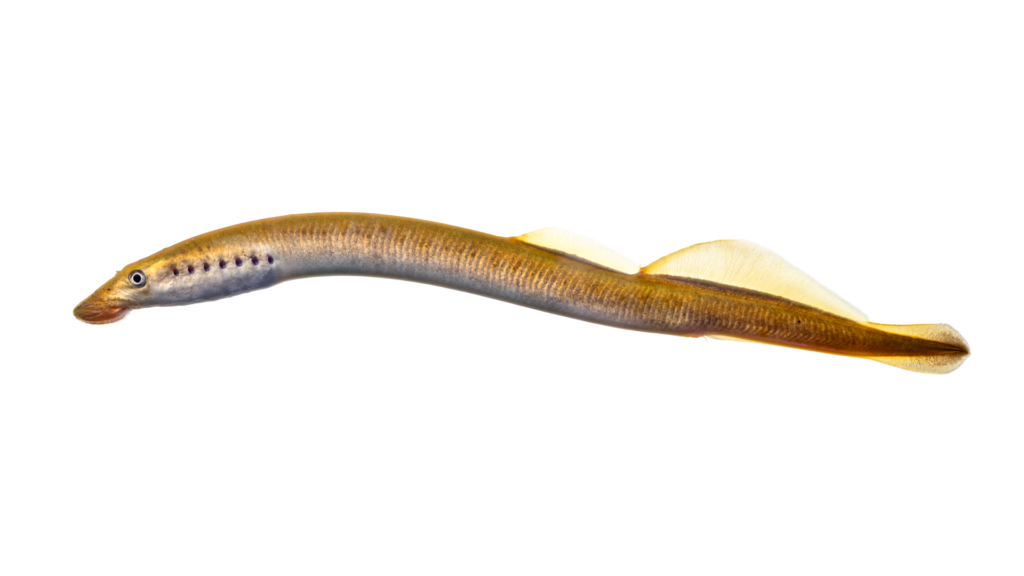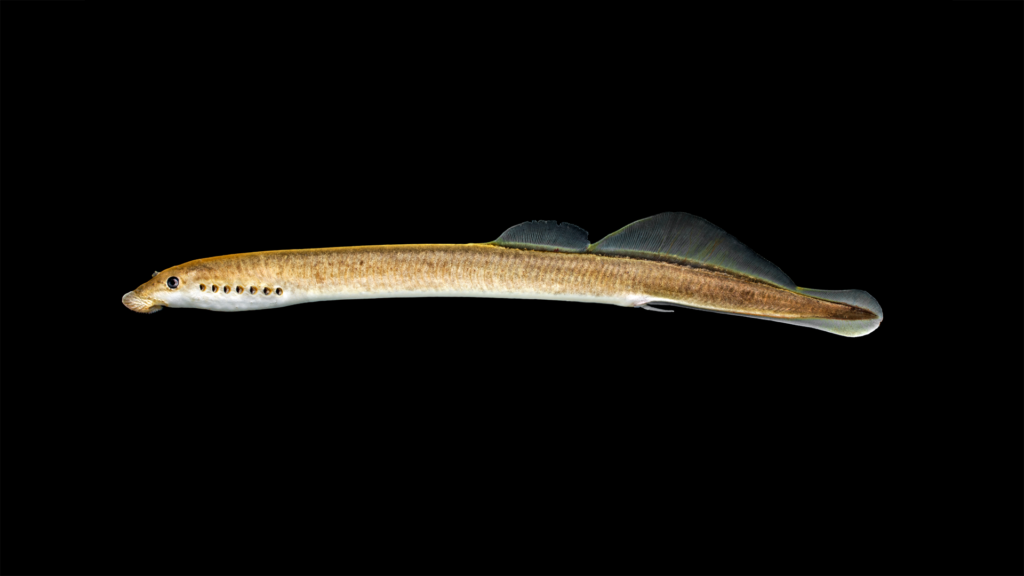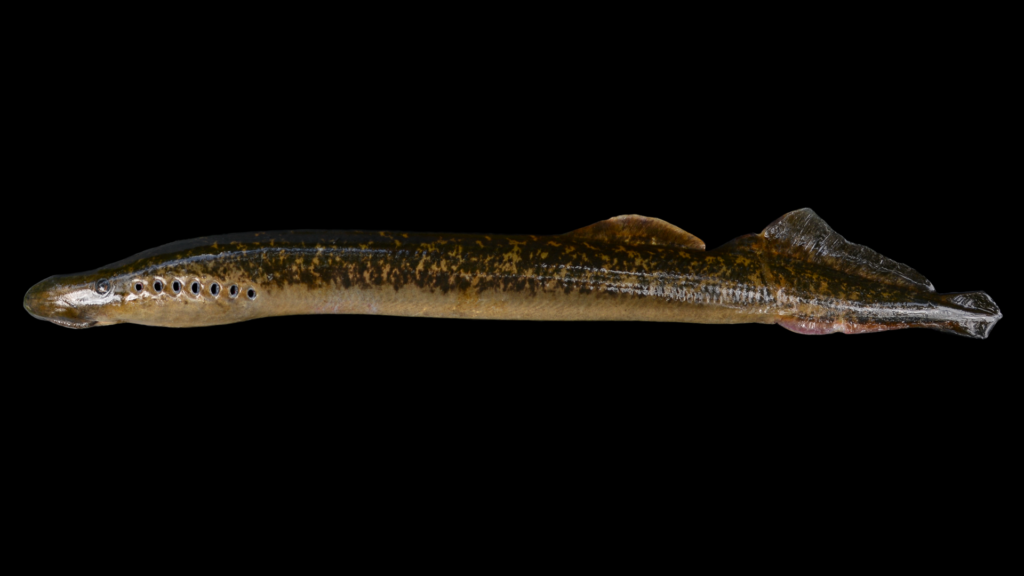Fritz Rohde1, Bryn H. Tracy2, and Michael Fisk3
1Wilmington, NC; 2Apex, NC; 3North Carolina Wildlife Resources Commission, Aquatic Wildlife Diversity Program, Mebane, NC
The American Brook Lamprey, Lethenteron appendix (Dekay, 1842) (Figure 1), was first discovered in August 1977 in the French Broad River at the mouth of Spring Creek in Hot Springs (Madison County) in western North Carolina by Tennessee Valley Authority biologists, and until recently, this imperiled species has only been found in Spring Creek (Map 1; Tracy et al 2020).


In March 2021 we received a report from Todd Pusser of a sighting by Rufus Johnson, an amateur fossil-hunter and landowner in Halifax County (Roanoke River basin) of spawning small lampreys in “his” stream. Our initial assumption was they were Least Brook Lamprey, Lampetra aepyptera (Abbott, 1860), (Figure 2), because it is the only brook lamprey known to be found in eastern North Carolina (Map 2), along with the much larger parasitic Sea Lamprey, Petromyzon marinus Linnaeus, 1758, (Figure 3; Map 3) (Tracy et al. 2020; Tracy et al. (in press)).




One of us held out hope that it might be American Brook Lamprey because it has been documented in the nearby Meherrin River basin in Virginia (Jenkins and Burkhead 1994). The pandemic slowed us down for a year, but we visited the area on March 02, 2022. We quickly found adult lampreys in a tiny tributary of a larger unnamed tributary of Quankey Creek and immediately determined that they were indeed American Brook Lamprey. More individuals were observed in the larger unnamed tributary, and later that afternoon, additional adults were also found in nearby Little Quankey Creek. Thus, this represents the second location of the species in North Carolina, approximately 370 air miles east of the Spring Creek site (Map 1). Surveys for American Brook Lamprey within the Roanoke River basin will continue in order to document the specie’s current distribution in North Carolina.
Fritz will be presenting the results of this discovery at the upcoming 34th Annual Meeting of the North Carolina Chapter of the American Fisheries Society in Durham, February 21-23, 2023 (https://nc.fisheries.org/2023-ncafs-meeting/).
References
Jenkins, R.E. and N.M. Burkhead. 1994. Freshwater fishes of Virginia. American Fisheries Society. Bethesda, MD. 1080 pp.
Tracy, B.H., F.C. Rohde, and G.M. Hogue. 2020. An annotated atlas of the freshwater fishes of North Carolina. Southeastern Fishes Council Proceedings No. 60. 198 pp., https://trace.tennessee.edu/sfcproceedings/vol1/iss60/1.
Tracy, B.H., F.C. Rohde, S.A. Smith, J.L. Bissette, and G.M. Hogue. (in press). The freshwater fishes of North Carolina – a guide to their identification and distribution. University of North Carolina Press, Chapel Hill, NC.
My grandson found some of what we believe are these lamprey. They are in slow creek in Cherokee County, NC. I am 65 and have never seen these here.
Good find! Slow Creek and Peachtree Creek have Mountain Brook Lamprey and they are out and about spawning this time of year. They are really hard to see outside of spawning season because they live in mostly sand.
I’m pretty sure I saw one of these in Transylvania County on the French Broad near Rosman yesterday. We watched it for a couple minutes in shallow water before it burrowed into the silty, sandy riverbed. It was definitely a fish of some sort, several inches long, and swam with a serpentine S shaped body motion. Coloring and fins appear to match the pics above. I had never seen anything like it in the area, only in aquariums.
At East LaPorte Park in Jackson County with my family yesterday fishing for brook trout, and we believe we saw a small specimen.
Hi Shane —
You are close in your identification. The species you saw was most likely Mountain Brook Lamprey, Ichthyomyzon greeleyi (http://ncfishes.com/freshwater-fishes-of-north-carolina/ichthyomyzon-greeleyi/). American Brook Lamprey is restricted to Madison and Halifax counties in North Carolina. For more information on lampreys in North Carolina, please see – https://ncfishes.com/lamprey-family-petromyzontidae-diversity-in-north-carolina/ and https://ncfishes.com/.
Believe we found one in east laporte park on the tuckasegee in Jackson county
Hi Shane —
You are close in your identification. The species you saw was most likely Mountain Brook Lamprey, Ichthyomyzon greeleyi (http://ncfishes.com/freshwater-fishes-of-north-carolina/ichthyomyzon-greeleyi/). American Brook Lamprey is restricted to Madison and Halifax counties in North Carolina. For more information on lampreys in North Carolina, please see – https://ncfishes.com/lamprey-family-petromyzontidae-diversity-in-north-carolina/ and https://ncfishes.com/.